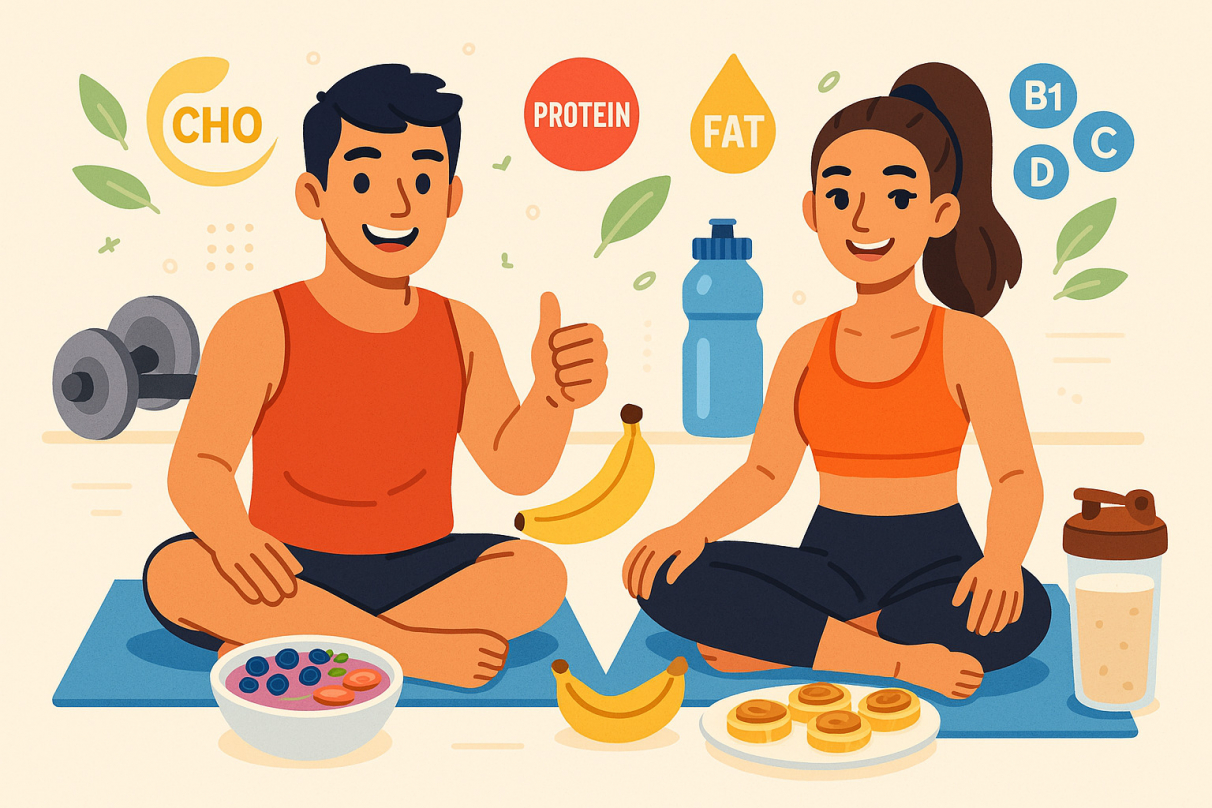A Beginner’s Guide to Fueling Your Fitness

Introduction:
So, you’ve started working out and are eager to see results – fantastic! ? But have you thought about sports nutrition and how it can boost your progress? Simply put, sports nutrition is all about fueling your body to perform better and recover faster. It’s important for everyone, not just pro athletes. In fact, pairing good nutrition with your training can *“greatly improve an athlete’s performan (Sports Nutrition: A Complete Guide) – and that includes beginners like you and me. This guide will walk you through the basics of eating right for an active lifestyle. We’ll cover what to eat before and after workouts, how to balance protein, carbs, and fats, the role of vitamins and hydration, plus a peek at supplements. Don’t worry – it’s not as complicated as it sounds! By the end, you’ll have practical tips to nourish your body, boost your energy, and reach your fitness goals faster (while feeling great, too). Let’s dive in!
Sports Nutrition Basics: Why Food Matters More Than You Think
Eating isn’t just about curbing hunger – for fitness enthusiasts, it’s about providing fuel and building blocks for the body. Sports nutrition refers to eating in a way that supports your workout routine and overall active lifestyle. Think of your body like a car: without gas (food), it won’t get far. With the right gas, it runs smoother and faster. Beginners often overlook nutrition, but it’s a game-changer. Here are the basics:
-
Food = Fuel (and Recovery): When you exercise, your muscles use up energy. Proper nutrition replenishes that energy and repairs your muscle fibers so you come back stronger. If you’ve ever felt utterly exhausted after a workout or extremely sore the next day, the culprit could be poor fueling. Conversely, eating well can reduce fatigue and soreness. In other words, abs might be made in the gym, but they’re revealed in the kitchen!
-
Balance is Key: A balanced diet with carbohydrates, protein, and fats in the right proportions is essential. Each of these macronutrients plays a unique role (we’ll get into that next). For now, know that experts recommend a mix – roughly about 45–60% of your calories from carbs, 20–35% from fats, and 15–25% from pro (Nutrition and athletic performance: What to consider) for an active adult. Don’t get too hung up on numbers though; the main idea is to include all food groups. As Colorado State University nutritionists put it, *“Athletes achieve peak performance by training and eating a balanced diet including a variety of food (Nutrition for the Athlete – 9.362 - Extension) That means plenty of whole grains, lean proteins, healthy fats, fruits, and veggies on your plate.
-
Individual Needs Vary: Everyone is a bit different. Your optimal nutrition depends on factors like your workout intensity, body size, gender, and g ( Five Nutrition Questions Any Beginner Athlete Should Ask – QT2 Systems). For instance, a marathon runner needs way more carbs than someone doing a 20-minute home workout. Similarly, women might need to watch certain nutrients (like iron) more closely than men. But don’t let that overwhelm you – the general principles of sports nutrition apply to most people starting out. You can tweak portions as you learn what makes you feel best.
Real-life example: When I first started exercising, I thought surviving on salad and doing cardio would get me fit. Instead, I felt drained and even dizzy at the gym. After consulting a trainer, I began eating a banana with peanut butter before workouts and added a protein shake afterward. The difference was night and day – I had more energy and my muscles weren’t as sore.
Lesson learned: Working out is only half the equation; nutrition completes the picture.










Comments : 0